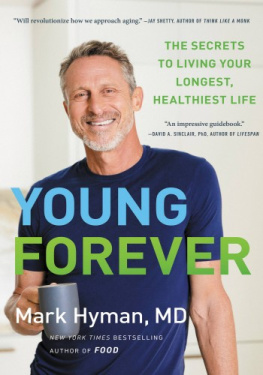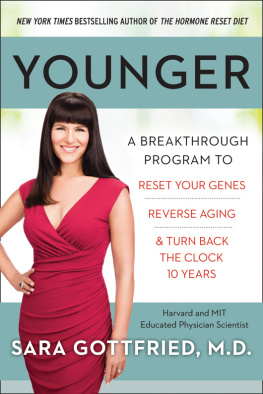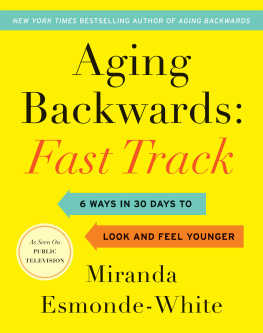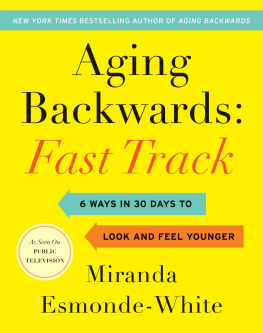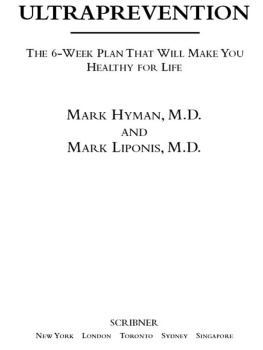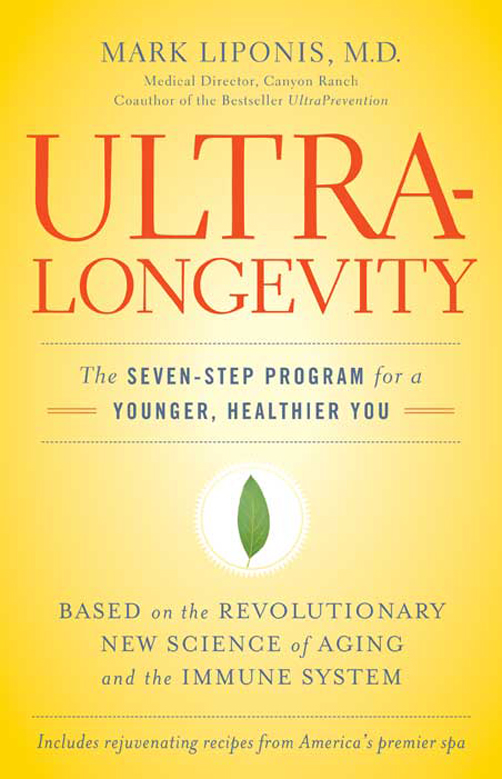Copyright 2007 by Mark Liponis, MD
All rights reserved. Except as permitted under the U.S. Copyright Act of 1976, no part of this publication may be reproduced, distributed, or transmitted in any form or by any means, or stored in a database or retrieval system, without the prior written permission of the publisher.
Little, Brown and Company
Hachette Book Group
237 Park Avenue
New York, NY 10017
Visit our website at www.HachetteBookGroup.com.
The Warner Books name and logo are trademarks of Hachette Book Group, Inc.
First eBook Edition: September 2007
ISBN: 978-0-316-02624-6
ALSO BY MARK LIPONIS, MD
UltraPrevention (with Mark Hyman, MD)
For my parents, Charles and Bess Liponis, who taught me the importance and value of love and family
THE LEGENDARY SPANISH explorer Juan Ponce de Len supposedly spent the year 1513 searching for the Fountain of Youth. He wasnt the first person to lookstories of waters that restore youth to the aged have been popular throughout history. Such waters have been said to be located in Ethiopia, in distant Asia, in northern Europe, or many other places off the beaten pathfor centuries people have explored, but without any luck.
After landing in the Americas, the Spanish began to hear tales from indigenous peoples about a fountain that could make adults young again. Excited at the prospect, they thought there was a strong chance these waters were located in what is now the state of Florida, or on the island of Bimini, just north of Cuba, which is where Ponce de Len eventually sailed. He never did find the fountain there, but he did locate the Bahama Channel, the quickest route between Cuba and Europe. Ponce de Len eventually was made a knight and later, governor of Florida. He died in 1521 at the relatively old age (for an explorer) of sixty-one.
His failure didnt stop countless other explorers, dreamers, alchemists, and adventurers from seeking a fountain of youth, whether in the form of water, a tonic, a pill, or anything else that would guarantee agelessness. No one, however, seemed to find it.
Then theres Laura, one of my patients. Over the last decade Laura has taken up, and mastered, both golf and tennis; whenever she comes to Canyon Ranch she manages to find a competitive game. She wasnt always so healthy, however. An asthmatic child, Laura visited the doctor frequently and was treated with shots of adrenaline numerous times even as a young adult. And in her early sixties she was diagnosed with breast cancer (she had a mastectomy).
But now Laura is in excellent health for someone her age, which is eighty-one (or twenty years older than Ponce de Len was when he died). In fact, Laura is twenty years younger than her chronological age. Her heart purrs like a tuned engine. Tests of the elasticity of her arteries and heart rate variability are perfect. Her blood tests are all better than normal and into the optimal range.
Laura hasnt found the Fountain of Youth per se, but she is in on a secret that is helping her stay younger than everyone around her.
What is that secret? Laura has learned how to live in harmony with her immune system.
The theory guiding this new way of living stems from a growing body of research in a field that scientists and medical professionals are just beginning to understand: immunology, or the study of the immune system. What we are learning is that it isnt impossibleand, in fact, it might be quite probablefor humans to live to be well over one hundred years old.
Now, you might say that you dont want to live to one hundred. Who wants to spend years sitting in a wheelchair in the bleak hall of a cold, unpleasant nursing home? Meanwhile, your joints are arthritic, your bones brittle, your arteries clogged, your brain foggy, your lung capacity shrunk, and your muscle strength diminished. Your heart cant pump properly, you feel tired, and youre so constipated that having a good day means having a bowel movement.
Who wants to live to be one hundred if the above is an accurate description of aging?
But over the last few years medical science has learned that all the conditions just mentionedall these terrible and painful signs of agingare mainly caused by problems within the immune system.
In other words, the part of the body that was meant to defend usthe immune systemis actually turning on us, and causing us to age.
The fact that the immune system can turn dangerous has been known for some time. For a few decades now, medical science has understood that certain diseases, such as thyroid disease, multiple sclerosis, rheumatoid arthritis, ulcerative colitis, diabetes, and Crohns disease, are diseases caused by the immune system, or what are known as autoimmune diseases.
These autoimmune diseases occur when the body is attacked by its own immune system. People who come down with autoimmune diseases tend to have highly overactive immune systems whose myriad weapons are attacking the bodys own tissues instead of the various viruses and bacteria they are supposed to fight.
Scientists are beginning to understand that it is not just a few diseases that can be chalked up to this immune system hyperactivity. It now appears that every disease of aging is associated with immune hyperactivity, and this hyperactivity is largely responsible for human aging itself.
But just as were realizing the nature of this medical issue, we are also starting to figure out ways to cope with it. This means that if you take the best possible care of your immune system and can prevent it from becoming overactive, you may well live to be more than one hundred years oldand be of healthy mind and body during every one of those years.
To put it another way, instead of feeling terrible in a nursing home, you can, like Laura, spend your life outdoors playing tennis, indoors learning new skills, or enjoying time with your loved onesat any age.
If you can enhance your immune system, you wont live forever,but you may:
Live more than a hundred years
Be free from disease throughout your life
Keep your brain sharp
Be more physically fit
Feel more energetic
Be able to cope with stress
Feel and stay younger than you ever imagined
Now, before you learn more about the immune system and its effects on your health, take the following test to see how much you already know.
EVER WONDER WHY people seem to age at different rates?
As you will soon learn, the speed of aging is determined by your immune system and, in fact, nearly all diseases are now thought to be caused by an immune system breakdown. Without a strong system, you will neither look healthy nor be healthy.
Following are twenty-one questions that touch on your lifestyle and your immune system. Answer them honestly, tally up your score, and discover how fast you are aging.
1. Do you need to lose ten pounds?
a. Add 10 points if your weight is appropriate for your height.
b. Add 5 points if you need to lose only ten pounds.
c. Add no points if you need to lose more than ten pounds.
Carrying around extra weight is stressfulnot just on your back and your joints, but on your immune system too. Besides causing you to be at higher risk for diseases such as diabetes, heart disease, and cancer, extra weight also can overstimulate your immune system.
One of the best ways to measure the extent of immune activation is the C-reactive protein (CRP) blood testthe higher your CRP levels, the more active your immune system is. A March 2006 article in the Journal of the American Medical Association


